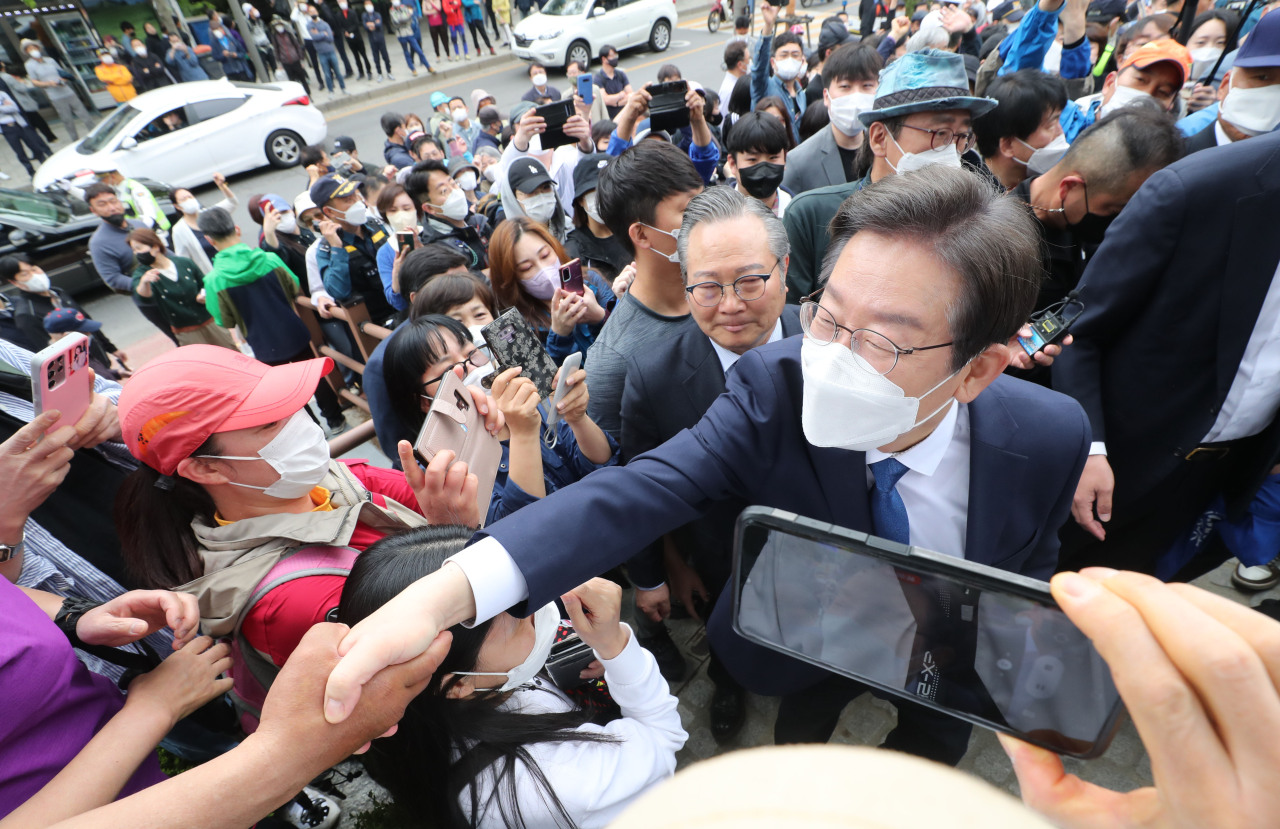Lee Jae-myung, one of the main figures in today’s South Korean politics, has officially announced his bid to return to the political stage, indicating a step toward the next presidential race slated for 2027.
Lee, the former Gyeonggi Province governor and presidential candidate for the Democratic Party of Korea, on Sunday declared he would run in the parliamentary by-election for a constituency in Gyeyang-gu of Incheon, which has been left vacant from Song Young-gil resigning from the post to run in the Seoul mayoral election.
His return, despite being earlier than expected, was anticipated to occur at some point.
The Democratic Party has already made up its mind to hand over the steering wheel to Lee and his aides, as evidenced from its election of Rep. Park Hong-keun, former chief of staff for Lee’s presidential campaign as its floor leader. The Democratic Party has also nominated figures with close ties to Lee for major metropolitan and gubernatorial elections.
It now seems that Lee will promptly return to the political scene effectively as the new leader of the Democratic Party, even though the seat is filled by Rep. Yun Ho-jung for the time being.
The path Lee is taking is somewhat similar to the path that President Moon Jae-in took in becoming the 19th president of South Korea in 2017. Moon made a comeback to become president after an unsuccessful attempt five years earlier against his predecessor, Park Geun-hye, in 2012.
After losing the 18th presidential election, Moon, who was already serving as a first-term lawmaker for a constituency in Busan, came back to center stage in 2015 by becoming the chairman of the New Politics Alliance for Democracy, the predecessor of the Democratic Party.
Under his leadership, he brought many of his close aides to the National Assembly as legislators in the 2016 parliamentary elections, then won the party’s ticket to run for the 19th presidential election.
Lee is walking a similar path, albeit in a different order. He is widely tipped to be the next leader of the liberal bloc when the party holds its nationwide convention in August.
Moon earned his party’s ticket to the presidential race for the second time after taking over the party as the new chief and growing his influence among its members. If Lee wins the by-election in June, he could be on course to pursue the chairman seat and officially stand as the new leader.
And if Lee grows his influence within the party and successfully concludes the next parliamentary elections in 2024, he could be well on track to try again for the presidency and succeed President-elect Yoon Suk-yeol in 2027.
Yet the risk remains for Lee to be thwarted from the potential path to another presidential race. The Democratic Party is rumored to face another internal feud after Lee publicly announced his by-election bid.
Sources say close aides of Moon and established figures within the Democratic Party are opposed to Lee running for the chairman seat in August, as they fear Lee’s entrance to the National Assembly could already serve as a blockade for their political actions.
Lee’s influence in the party could also be at stake if the Democratic Party performs subpar in the upcoming local elections. Lee could be held responsible for two elections at once, having come out of the shadows far earlier than expected.
History shows that early returners in South Korean politics did not fare well upon return.
Hong Joon-pyo of the People Power Party was elected as the new chairman for the party in July 2017 after suffering defeat in the presidential race just two months earlier. But he resigned from the post less than a year later in June 2018, after his party lost by a large margin in the 2018 local elections.
Former Rep. Chung Dong-young made an unsuccessful attempt for a lawmaker seat just 85 days after losing the presidential election in 2007, and was sidelined in the political scene.
Moon, on the other hand, had to wait in the wings for about two years after losing the 18th presidential election, seemingly to take responsibility for losing the election. He also spent a considerable amount of time rallying support for victims of the Sewol ferry sinking in 2014.
Despite Lee’s loss in the presidential race, a solid support base seems to hint that Lee could be an exception. Lee lost to Yoon by only 0.73 percentage point in the 20th presidential election, and has continued to enjoy support from the general public.
As of 11 a.m. Monday, Lee’s online fandom community had close to 220,000 members after the community was formed just two months ago on March 10.
By Ko Jun-tae (
ko.juntae@heraldcorp.com)








